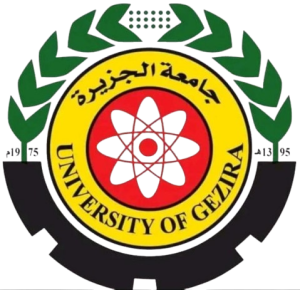About U oF G
University of Gezira – Excellence in Education, Research, and Community Service
- University High Administration
- About the University
- VISION & MISSION
- Aims and objectives
- University Council
- University senate
- Vice chancellor Message
- Facts and Figures
- Organizational Structure
- Transformation in the Institutional Identity
- Strategic Partnerships
- Accreditations and Awards
- About Wad Madani
- About Sudan

About University Of Gezira
The Establishment and Development of the University Of Gezira
The Republican Decree for the establishment of the University of Gezira, headquartered in Wad Madani, was issued on November 9, 1975. The Gezira region was chosen due to its significant agricultural, economic, educational, and social importance. The university began its academic programs in 1978 with four faculties: the Faculty of Agricultural Sciences, the Faculty of Economics and Rural Development, the Faculty of Medicine and Health Sciences (now the Faculty of Medicine), and the Faculty of Science and Technology (now the Faculty of Engineering and Technology). The first batch of graduates from these faculties completed their studies in 1984.

Reasons and Justifications for the Establishment of the University of Gezira:
The first university guide quotes causes and justifications for establishing the University of Gezira as follows: “The mission of the universities is to seek science and knowledge, reveal the secrets of nature, build human civilization in all its dimensions, assess the balance of justice, support the inherent spiritual values, raise the word of truth and prosperity, eliminate the injustice and corruption, build the mind and conscience of mankind, develop expertise and skills, enrich and refine the talents, and achieve all that through constructive cooperation in an atmosphere of brotherhood, love and fidelity”.
The University of Gezira was established to serve the community, and to link education with the requirements of development and make it more relevant to human and environmental needs. This is evident from the content of educational mission entrusted to it and identified in its function “to study the environment of Sudan and in particular the rural environment, to identify the issues and conduct research around it”. With this concept, the University of Gezira began its path exploring problems of society, training professional cadre capable of utilizing the potential of the rural areas of Sudan and conduct basic and applied scientific research to serve the rural community. Now and after more than three decades since its establishment, the University comprises twenty three faculties spreading all over the Gezira state, in addition to the community college. The number of research institutes in various scientific and humanitarian disciplines has risen to nine, specialized research and training centers were established in faculties and institutes
University of Gezira Campuses
The University of Gezira is currently spread over twelve campuses in the state of Gezira and one in the northern state. Campuses in Wad Medani are the University City in Neshaishiba, Elrazi Campus, and Hantoub Campus. The University City in Neshaishiba is located on the northern outskirts of the city and it includes the university administration, central deanships, Faculties of Agricultural Sciences, Engineering and Technology, Economics and Rural Development, industries engineering and technology, and the National Institute for Development of Horticultural Exports, the Sugar Institute and the University of Gezira Farm. Elrazi campus is located in the southern part of the city of Wad Medani. It includes Faculties of Medicine, Pharmacy, Applied Medical Sciences, Medical Laboratory Science, Dentistry, and Mathematical and Computer Sciences, and the Water Management and Irrigation Institute, The National Cancer Institute and the National Oilseeds Processing and Research Institute, in addition to the Education Promotion Center, University Press and University of Gezira Consulting House.

The campus in Hantoub houses the Faculty of Education – Hantoub and the Institute of Islamic Studies and Islamization of Knowledge. There are eight other University campuses in different locations in the Gezira state, including the Faculty of Arts and Humanities Sciences and Faculty of Languages which are located in Elkamlin town, the Faculty of Commercial Studies is located in Alhilalia town, the Faculty of Education – El Hassahissa located in El Hassahisa town, the Faculty of Animal Production located in Elmanagil, the Faculty of Health and Environmental Sciences located in Elhush in the South Gezira Locality and the Faculty of Developmental Studies located in Umm Elgora Locality. At the Locality of Wad Medani in addition to the city of Wad Medani campuses, there is the Faculty of Media in Fadasi (Wad Medani suburb). ALso, in Abuharaz (Wad Medani suburb) campus there are the faculty of law and the faculty of science. Finaly, at Eldaba town (Northern state) there is the National Institute for Desert Studies.
Students at the University of Gezira
The number of students enrolled in the University of Gezira has reached 28000 students registered for bachelor’s degrees, 4800 for technical diplomas and 4000 students in postgraduate programs. This has coincided with the development of the infrastructure of Faculties and Institutes and furnishing.
Distinctiveness of the University of Gezira
UOFG is one of the first Sudanese universities that began the Arabization in all its colleges in the academic year 1990-1991, starting from the thirteenth batch. The university participated in issuing many dictionaries to overcome the problem of scientific terminology and provided many books written in Arabic in various sciences from sister Arab countries. The university also encouraged colleges and institutes to hold seminars and workshops for curriculum Arabization and allocated incentives for faculty members and covered the costs of printing books to provide the Arabic reference. The number of books currently authored by Al-Jazeera University professors in various specialties under the supervision of the Administration of Arabization, Authorship, and Publishing has reached about 120 books. Al-Jazeera University established a specialized department for quality and evaluation, with quality units in all colleges, institutes, central deanships, and specialized central departments at the university. It has a board of directors chaired by the university president to pay attention to the application of self-evaluation and quality standards at the university, aiming to improve performance.

